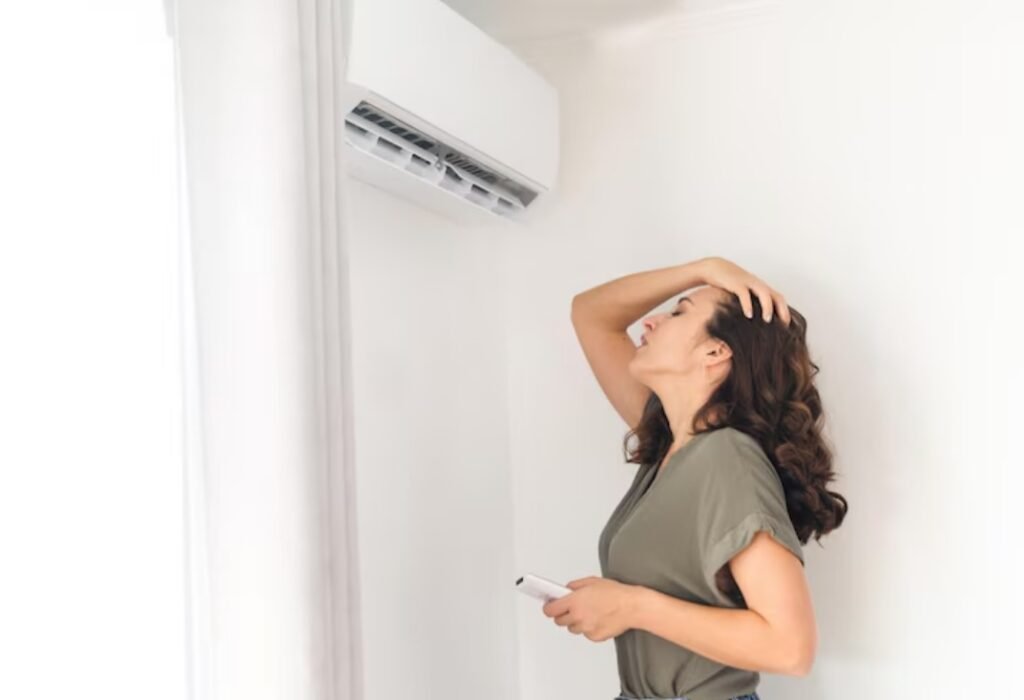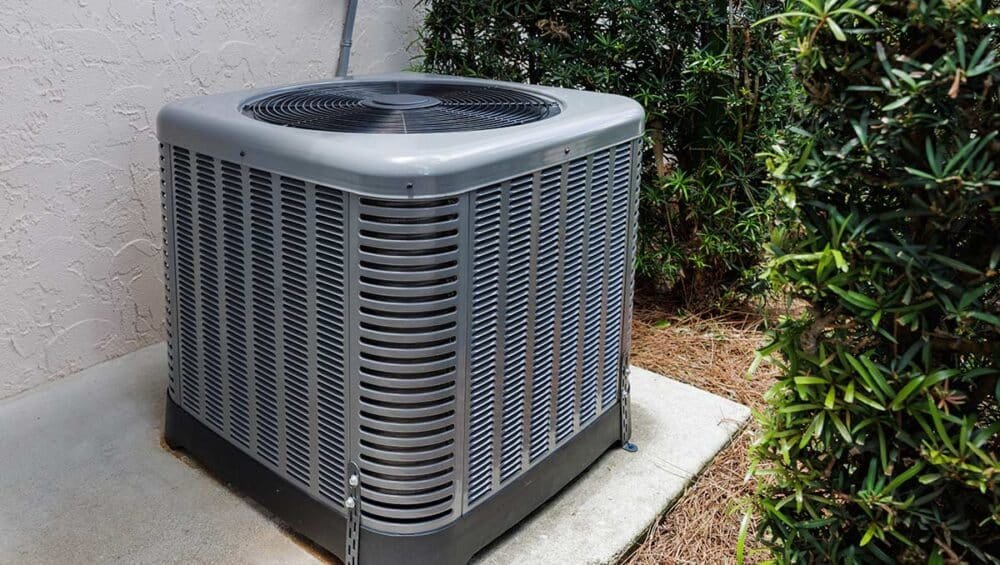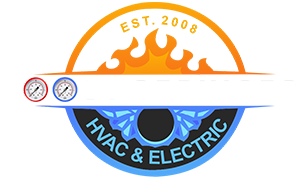
Table of Contents
A refrigerant leak is one of the most common causes of AC blowing hot air. Refrigerant is the chemical that cools the air inside your AC unit. If there’s a leak, the AC cannot cool the air effectively, leading to warm air blowing out. This issue not only reduces the efficiency of your AC but can also increase your energy bills as the unit works harder to achieve the desired temperature. Furthermore, refrigerant leaks can sometimes be harmful to the environment due to the release of chemicals.
Identifying a Refrigerant Leak
If you suspect a refrigerant leak, you might notice the following signs:
- Hissing or bubbling sounds coming from the AC unit
- Reduced cooling efficiency
- Ice formation on the refrigerant lines
These indicators are not only signs of a refrigerant leak but also warnings that your AC unit may soon fail completely if not addressed. The presence of ice on the lines can further exacerbate the issue by causing additional strain on the compressor, leading to potential mechanical failures. Therefore, early detection and intervention are crucial.
Fixing the Leak
For home air conditioners, it’s best to call a professional HVAC technician to handle refrigerant issues. They will repair the leak and recharge the system with the correct amount of refrigerant. Attempting to manage refrigerant levels on your own can be dangerous without the proper tools and expertise. For your car, a certified mechanic can perform a similar service, ensuring your vehicle’s AC runs efficiently. Regular maintenance checks can help in early detection of leaks, preventing costly repairs in the future.
2. Faulty Compressor
The compressor is the heart of the AC system, and if it’s not working correctly, it can cause the air conditioner to blow warm air. The compressor circulates refrigerant between the evaporator and condenser, which is crucial for cooling the air. Without a properly functioning compressor, the entire cooling cycle is disrupted, leading to inadequate temperature regulation.
Symptoms of a Faulty Compressor
- Loud or unusual noises coming from the AC unit
- The AC unit fails to start
- Reduced airflow from the AC vents
These symptoms indicate that the compressor might be on the brink of failure and require immediate attention. Ignoring these signs can lead to more significant damage, affecting other components of the AC system. The unusual noises often signify that the internal parts of the compressor are worn out or damaged, necessitating professional inspection.
Repairing the Compressor

A faulty compressor often requires professional repair or replacement. In the case of a car, a mechanic can diagnose and fix the problem, while a certified
3. Electrical Issues
Electrical problems can also lead to your air conditioner blowing hot air. These issues might include blown fuses, tripped circuit breakers, or faulty wiring within the AC unit. Electrical issues are often overlooked but play a crucial role in the overall functionality of the AC system.
Diagnosing Electrical Issues
- Check the circuit breaker for any tripped switches and reset them if necessary.
- Inspect the AC unit’s wiring for signs of wear or damage.
- Look for blown fuses and replace them if needed.
These diagnostic steps can help identify the source of electrical problems quickly. However, it’s essential to exercise caution when dealing with electrical components to avoid potential hazards. Faulty wiring can lead to shorts or electrical fires, which can damage your property and pose safety risks.
Solving Electrical Problems
If you’re comfortable working with electrical systems, you can address minor issues yourself, such as resetting circuit breakers or replacing fuses. However, for more complex problems, it’s advisable to consult an electrician or HVAC professional to ensure safe and effective repairs. Regular inspection of the electrical components can prevent future issues and ensure consistent performance of the AC unit.
4. Clogged Air Filters
Clogged air filters are another common cause of an AC unit blowing warm air. Over time, dust and debris can accumulate in the filters, restricting airflow and reducing the unit’s cooling efficiency. Clean air filters are essential for maintaining good air quality and efficient cooling within your home or vehicle.
Recognizing Clogged Filters
- Reduced airflow from the AC vents
- Visible dirt and debris in the filter
- Increased dust in your home or car
These signs indicate that it’s time to clean or replace the air filters. A clogged filter not only impacts cooling efficiency but also strains the entire system, potentially leading to more severe mechanical issues. Moreover, dirty filters can circulate allergens and pollutants, affecting indoor air quality and health.
Cleaning or Replacing Air Filters
Regular maintenance is key to preventing clogged filters. For home units, check and replace filters every 1-3 months, depending on usage and manufacturer recommendations. This simple maintenance task can significantly improve your AC system’s efficiency and longevity. In cars, consult your vehicle’s manual for guidance on changing the cabin air filter, as a clean filter enhances the overall driving experience by providing fresh air.
5. Thermostat Issues
The thermostat controls the temperature settings in your AC unit. If it’s not working correctly, it can lead to the system blowing hot air. A faulty thermostat can misread temperatures, causing the AC to operate inefficiently.
Identifying Thermostat Problems
- The AC doesn’t turn on or off at the set temperature
- The display is blank or unresponsive
- Inconsistent temperature readings
These issues can cause your AC system to work harder than necessary, leading to increased energy consumption and wear on the unit. A malfunctioning thermostat can also result in uncomfortable indoor temperatures, affecting overall comfort.
Fixing Thermostat Issues
For simple thermostat issues, such as dead batteries or incorrect settings, you can often resolve the problem yourself. However, if the thermostat is faulty, consider replacing it with a new model. Upgrading to a programmable or smart thermostat can offer greater control over your home’s climate, leading to energy savings and improved comfort. For car AC issues, a mechanic can diagnose and repair the thermostat, ensuring optimal performance.

Proactive Measures for Reliable AC Performance
Regular Maintenance
Regular maintenance is crucial in preventing your AC unit from blowing hot air. Schedule annual inspections for both home and car systems to ensure they’re in top condition. This not only helps in catching potential problems early but also improves the overall efficiency of your AC unit. Routine checks can also extend the lifespan of your system, saving you money in the long run on replacements and repairs.
Professional Assistance
Engage professional services for more complex issues or regular check-ups. Experienced HVAC technicians and certified mechanics offer expertise and reliability, ensuring your AC system provides optimal cooling without unexpected breakdowns. Their specialized knowledge can help identify issues that may not be apparent to the untrained eye, ensuring comprehensive maintenance and repairs.
Community-Oriented Solutions
For community-based entrepreneurs and working-class individuals, collaborating with local, reputable HVAC service providers can enhance trust and reliability. By choosing local businesses that prioritize customer satisfaction and community engagement, you contribute to building a robust community network focused on quality service delivery. Supporting local services can also foster community growth and ensure that you receive personalized and attentive service.

Conclusion: Addressing the Causes of AC Blowing Hot Air for Lasting Comfort
Dealing with an AC unit blowing hot air can be frustrating, especially in the sweltering heat of Pasadena. By understanding the common causes and solutions, you can quickly address these issues and restore your comfort. Whether it’s a refrigerant leak, faulty compressor, electrical problem, clogged filter, or thermostat issue, timely intervention and regular maintenance are key to ensuring your air conditioning systems work efficiently.
By taking proactive measures and engaging with local community-focused service providers, you can ensure that your AC systems remain reliable and effective, providing cool comfort throughout the hot summer months. Remember, a well-maintained AC unit is not just about comfort but also about maintaining high standards of service and reliability in your home or business. Keeping your AC in top condition not only enhances your quality of life but also contributes to energy efficiency and sustainability.
Common Questions — Causes of AC Blowing Hot Air
Why is my AC suddenly blowing hot air?
The most common reasons are incorrect thermostat settings, a clogged air filter, tripped breaker at the outdoor unit, dirty or frozen coils, low refrigerant due to a leak, or a failed outdoor component such as a capacitor, contactor, or fan motor.
Can thermostat settings make the AC blow warm?
Yes. If the thermostat is set to Heat, Fan On, or a temperature above the room temperature, you will feel warm or room air. Set it to Cool, Fan Auto, and a target at least 3 to 5 degrees below current indoor temperature.
How does a dirty air filter lead to hot air from vents?
A clogged filter restricts airflow, reducing heat exchange and causing the evaporator coil to run too cold or even ice over. The result is poor cooling and sometimes warm air. Replace filters every 30 to 60 days during heavy use.
Could low refrigerant be the cause?
Yes. Low charge from a refrigerant leak reduces cooling capacity and can lead to warm air or icing. Only licensed HVAC technicians should locate the leak, repair it, and recharge to the correct level.
What outdoor unit issues cause hot air inside?
If the outdoor condenser is not running or is obstructed, the system cannot reject heat. Typical culprits include a tripped breaker, failed capacitor or contactor, debris blocking the coil, a seized fan motor, or damaged wiring.
Do dirty coils really make the AC blow hot?
Yes. Dirt on the indoor evaporator or outdoor condenser coil acts like insulation, preventing proper heat transfer. Even if the system runs, the supply air may feel lukewarm or warm under load.
Can ductwork problems make air feel hot in some rooms?
Leaky, disconnected, or poorly insulated ducts can pull hot attic or crawlspace air into the system or lose cooled air before it reaches living spaces, making supply air feel warm or uneven.
Why does the AC blow warm after a power outage or storm?
Outages can trip breakers, blow fuses, or lock out control boards. Verify breakers and the outdoor disconnect are on, wait five minutes, then restart in Cool. If the outdoor unit stays off, call a technician.
Is it possible the system is in heat mode by mistake?
Yes, especially with heat pumps. If the thermostat mode is Heat or the reversing valve or control board malfunctions, the system can deliver warm air. Ensure Cool mode and correct wiring or have a professional test the controls.
What quick checks can I do before calling a pro?
Basic steps include:
- Confirm thermostat on Cool and Fan Auto
- Replace a dirty filter
- Make sure supply and return vents are open and unblocked
- Clear vegetation and debris around the outdoor unit with at least 24 inches of clearance
- Check that the outdoor breaker or disconnect is on
When should I turn the system off and call immediately?
Shut it down and call if you see ice on lines or the indoor unit, smell burning or chemical odors, hear loud banging or screeching, or if breakers keep tripping. Running in these conditions can damage the compressor.
How can I prevent hot air issues in the future?
Change filters regularly, keep coils and the area around the outdoor unit clean, schedule annual professional tune ups, seal and insulate accessible ducts, and use reasonable thermostat setpoints to avoid excessive strain.
Will routine maintenance fix most causes of hot air?
Routine maintenance addresses many root causes by cleaning coils, verifying refrigerant charge, testing electrical components, clearing drains, and measuring airflow to restore proper cooling performance.

